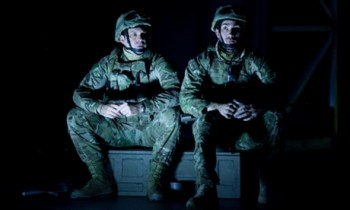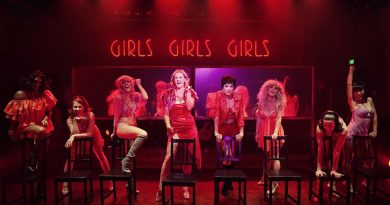Review: The Long Way Home, Sydney Theatre Company
The Long Way Home is theatre as therapy, a humanisation of headlines. Most of the people on stage aren’t actors; rather, they are returned servicemen, and they are telling their own stories, and the stories of their peers. This is what happens after a soldier returns home.
Inspired by The Two Worlds of Charlie F at the Royal Theatre Haymarket in the UK, playwright Daniel Keene and director Stephen Rayne (who devised Charlie F) have worked with several deployed Australian soldiers who have served in Afghanistan, Iraq, Timor-Leste, Somalia, and the Solomon Islands to try to create a work that represents their stories, both of their time serving, and their time when they have returned home and attempt to go back to their lives as before.

Warwick Young and Will Bailey in The Long Way Home. Photo by Lisa Tomasetti.
It’s an intriguing combination of truth and theatre, of theatrical ambition and theatrical limitation: clearly, since many of the performers are not trained actors and don’t approach stage narratives in the same way. A little stiffness or struggle, though, doesn’t serve to remove the audience from the story. Rather, it reminds you that those people are on stage for a reason, that this play was written for a reason, and the unreality of the performances end up as a reminder of how terribly, terribly real the fictionalised, streamlined stories are.
It’s not verbatim theatre. There are clear storylines, and recurring characters. There are struggles with wives. There’s a group of friends who used to play at being soldiers when they were children, and now are left with their own very real battle scars from very real and much more unreliable forts. There are physical and mental impairments. Rage and tears and boredom and companionship. Nightmares and night vacuuming.
Perhaps the most moving part of the piece, though, is the verbatim part: filmed interviews shot in close-up with returned soldiers, projected onto screens, recounting stories, memories. It might be difficult sometimes to act a reality and make it authentic even when it’s similar to your own, but it’s impossible to disguise the lived-in feeling of trauma and experience that has become a fact of life. These moments were the most difficult to watch, but the most impossible to stop watching.
It’s a good, strong experiment, this show. It is a good, strong reminder of the ability of the arts to help a person explore a tragedy, a problem, a life, from either side of the stage. It is an important gathering of societal truths, presented en masse with structure we can follow, characters we recognise, people whose struggles we can put a name to and therefore, we can empathise. Profoundly moving theatre.


